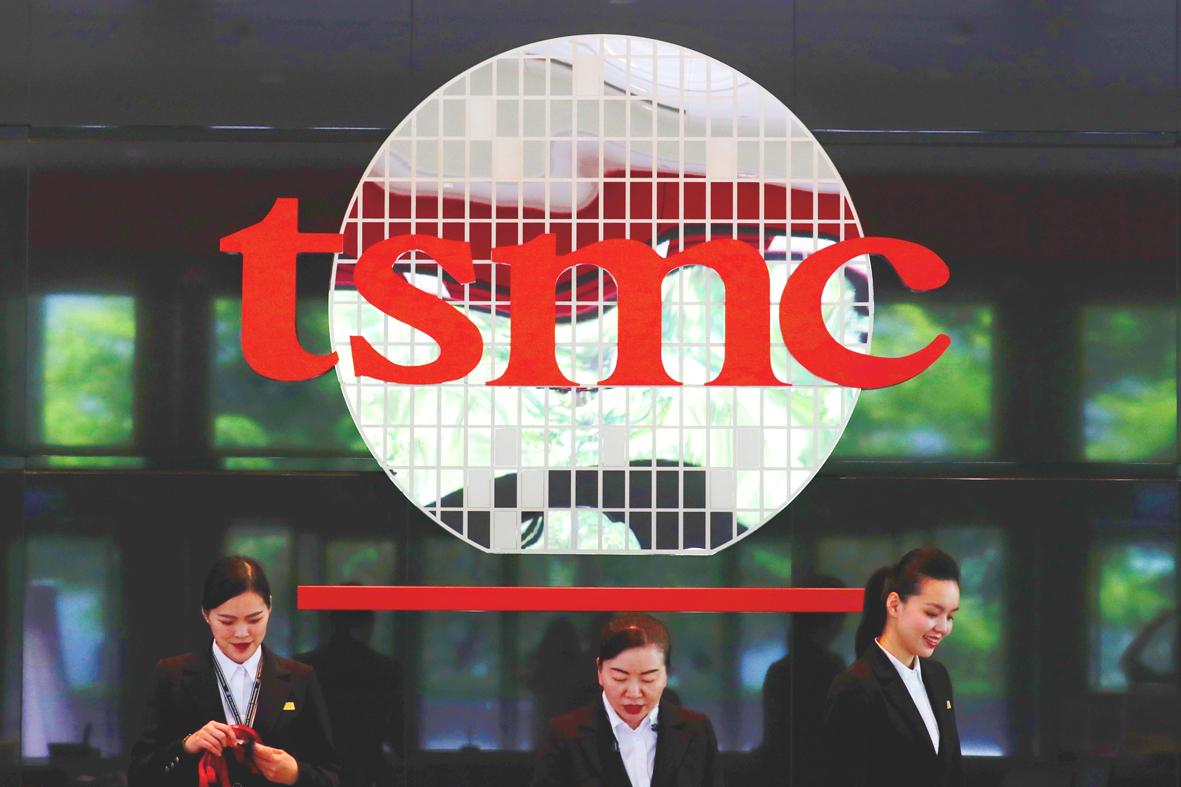Taiwan Semiconductor Manufacturing Co (TSMC, 台積電) yesterday cut its revenue growth forecast for this year as the COVID-19 pandemic is dampening demand for 5G smartphones and other consumer electronics, although it held US$15 billion to US$16 billion in capital spending for this year.
The supplier of chips for iPhones said that it is continuing to invest in advanced 7-nanometer (nm), 5nm and 3nm technology, as 5G deployments and high-performance-computing-related applications are expected to drive growth for next several years.
It said it plans to start volume production of 3nm technology in 2022 at its fab in Tainan, which would make TSMC the first contract chipmaker to offer the technology.

Photo: Ritchie B. Tongo / EPA-EFE
The company is also “evaluating its US fab plan,” TSMC chairman Mark Liu (劉德音) said in response to an investor’s question.
“If we do a US fab, it has to be a leading-edge fab, or close to a leading-edge fab,” Liu said.
However, the cost gap remains a challenge, he said.
The question came as investors watch proposed changes to US trade rules that would affect TSMC.
The US government is mulling a rule that would require an export license for semiconductors that are produced using US-designed tools and software in a bid to thwart Huawei Technology Co (華為).
“There might be some near-term impact” from the rule change if it is enacted, Liu said.
Meanwhile, the COVID-19 pandemic is weakening TSMC’s growth and revenue this year is expected to grow by between 15 percent and 18 percent annually, slower than the growth of “several percentage points above 17 percent” it estimated three months ago, the company said.
TSMC slashed its revenue forecast for the global semiconductor industry, saying it would have no growth this year or contract slightly. In January, the firm predicted annual growth of 8 percent.
The new forecast was based on the assumption that the pandemic would be well contained by June, the company said.
“We do observe that some end-markets have softened. Some consumer electronics, such as smartphones, have become much softer than we thought,” TSMC chief executive officer C.C. Wei (魏哲家) told investors.
“We expect some demand from our customers will be adjusted due to the COVID-19 outbreak, but TSMC will be less affected compared with other foundries,” Wei said.
Revenue this quarter is expected to slide 0.6 percent quarter-on-quarter to between US$10.1 billion and US$10.4 billion as weaker demand for smartphones and other consumer electronics would be offset by growth in high-performance-computing applications, such as servers, driven by a telecommuting trend, TSMC said.
Gross margin this quarter will be little changed from a range of 50 percent to 52 percent, compared with 51.8 percent last quarter, it said.
TSMC’s net profit surged 90.6 percent to a record NT$116.99 billion (US$3.88 billion) last quarter, compared with NT$61.39 billion in the same period last year. That translated into earnings per share of NT$4.51, up from NT$2.37 a year earlier.
On a quarterly basis, net profit rose 0.8 percent to NT$116.04 billion, or NT$4.47 per share.

TAKING STOCK: A Taiwanese cookware firm in Vietnam urged customers to assess inventory or place orders early so shipments can reach the US while tariffs are paused Taiwanese businesses in Vietnam are exploring alternatives after the White House imposed a 46 percent import duty on Vietnamese goods, following US President Donald Trump’s announcement of “reciprocal” tariffs on the US’ trading partners. Lo Shih-liang (羅世良), chairman of Brico Industry Co (裕茂工業), a Taiwanese company that manufactures cast iron cookware and stove components in Vietnam, said that more than 40 percent of his business was tied to the US market, describing the constant US policy shifts as an emotional roller coaster. “I work during the day and stay up all night watching the news. I’ve been following US news until 3am

UNCERTAINTY: Innolux activated a stringent supply chain management mechanism, as it did during the COVID-19 pandemic, to ensure optimal inventory levels for customers Flat-panel display makers AUO Corp (友達) and Innolux Corp (群創) yesterday said that about 12 to 20 percent of their display business is at risk of potential US tariffs and that they would relocate production or shipment destinations to mitigate the levies’ effects. US tariffs would have a direct impact of US$200 million on AUO’s revenue, company chairman Paul Peng (彭雙浪) told reporters on the sidelines of the Touch Taiwan trade show in Taipei yesterday. That would make up about 12 percent of the company’s overall revenue. To cope with the tariff uncertainty, AUO plans to allocate its production to manufacturing facilities in

Six years ago, LVMH’s billionaire CEO Bernard Arnault and US President Donald Trump cut the blue ribbon on a factory in rural Texas that would make designer handbags for Louis Vuitton, one of the world’s best-known luxury brands. However, since the high-profile opening, the factory has faced a host of problems limiting production, 11 former Louis Vuitton employees said. The site has consistently ranked among the worst-performing for Louis Vuitton globally, “significantly” underperforming other facilities, said three former Louis Vuitton workers and a senior industry source, who cited internal rankings shared with staff. The plant’s problems — which have not

COLLABORATION: Given Taiwan’s key position in global supply chains, the US firm is discussing strategies with local partners and clients to deal with global uncertainties Advanced Micro Devices Inc (AMD) yesterday said it is meeting with local ecosystem partners, including Taiwan Semiconductor Manufacturing Co (TSMC, 台積電), to discuss strategies, including long-term manufacturing, to navigate uncertainties such as US tariffs, as Taiwan occupies an important position in global supply chains. AMD chief executive officer Lisa Su (蘇姿丰) told reporters that Taiwan is an important part of the chip designer’s ecosystem and she is discussing with partners and customers in Taiwan to forge strong collaborations on different areas during this critical period. AMD has just become the first artificial-intelligence (AI) server chip customer of TSMC to utilize its advanced